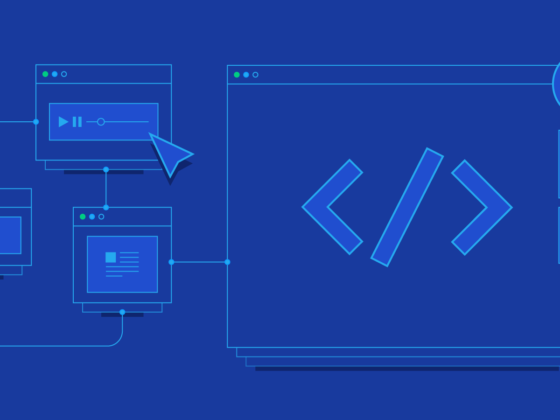Many companies need skilled tech workers to improve their systems, software, and apps. Enrolling in web development or coding bootcamp can provide learners with the essential skills employers seek without requiring a computer science degree. Given that web developer jobs will grow 13% by 2030, faster than average, coding bootcamps create new opportunities for career changers.
As a web developer, you may be involved in unplanned projects that provide new career opportunities and extra money. Coding bootcamp is a chance to get new skills fast, even if you’re a working adult already, and, what’s also essential for most learners, such courses are less expensive than most post-graduate programs.
To learn more about coding bootcamps, read on.
What is a coding bootcamp?
Coding bootcamps are intensive training programs that quickly prepare students for careers in the tech industry. Software engineering, data science, cybersecurity, and other tech jobs can all be pursued through such programs—most full-time bootcamps last three to four months. Part-time bootcamps are more time-consuming, but they allow students to attend without quitting their jobs.
Coding bootcamps appeal to people who want to jumpstart a new career without waiting four years for a bachelor’s degree. They also appeal to people who already have a four-year degree but want to advance their careers by improving or learning new skills.
Coding bootcamps are frequently referred to as a “quick path” to well-paying tech jobs. These alternative education schools are praised for increasing access to tech education by offering lower tuition costs, shorter class times, and a practical learning curriculum.
A coding bootcamp is a condensed course that teaches essential skills and provides hands-on training for people looking for jobs in the computer and information technology fields. They focus on the hard skills that employers seek, reducing the time and cost of pursuing a traditional college degree. As a result, bootcamps can help you get started on a rewarding technical career faster.
Benefits of a coding bootcamp for students
Coding bootcamps are becoming increasingly popular, with many people opting for them as a college alternative. This demand has opened up new opportunities for those with a coding background, including newcomers to the workforce and experienced professionals looking for a career change. Some people, however, are unsure whether or not coding bootcamps are legitimate.
The following is a guide to why coding bootcamps are worthwhile for people looking to start a career in technology.
10 benefits of coding bootcamps:
- The cost of a coding bootcamp is less than that of a traditional college program.
- Coding bootcamps prepare you for a specific job.
- Most coding bootcamps last anywhere from a few months to a year.
- Many coding bootcamps accept students who have no prior experience with technology.
- The majority of coding bootcamps are taught by industry experts, many of whom work in the fields they teach.
- Outside of the classroom, coding bootcamps offer mentoring, career coaching, and job assistance.
- Coding bootcamps frequently offer online, weekend, and night courses to accommodate working professionals’ schedules.
- Scholarships, the GI Bill, deferred tuition, and income share agreements are all options to pay for a coding bootcamp.
- Students get hired after graduating from coding bootcamps by major tech companies such as Google, IBM, Apple, Salesforce, Dell, and many others.
- A coding bootcamp graduate can expect to earn between $60,000 and $95,000 per year.
How to choose and enter a coding bootcamp
Coding bootcamps are ideal for people who want to pursue a career in technology but are unsure where to start. Students begin by selecting a coding bootcamp that prepares them for a high-demand career field. After that, they continue to hone their technical skills, learn programming languages, and work on real-world projects.
What should you look for in a coding bootcamp?
Due to the growing popularity of bootcamps, there are a plethora of options. However, not all coding bootcamps are worth your investments. Choosing the right one can mean the difference between quickly finding a job and struggling to find one.
Coding bootcamp types
There are three types of coding bootcamps, with each one tailored to its participants’ needs.
- Full-Time bootcamps: These help you find a job in just a few months and improve your technical skills. Even a complete beginner can become a professional in three to six months by attending one of the full-time bootcamps.
- Part-Time bootcamps: This type of coding bootcamps would fit working professionals who want to get new knowledge and upgrade their skills. They require less time commitment than full-time programs, and coding classes here typically take place on weekends and evenings.
- Online bootcamps: People from all over the world are welcome to attend this format of coding bootcamps. Online students have access to the same tools as in-person learners, and while most online bootcamps are self-paced, some still require regular attendance.
Programs for coding bootcamps
The number of topics covered by coding bootcamp programs has exploded in the last few years. Students previously had only a few options for programs, such as software engineering or web development. The industry has grown significantly since then. A few of the most popular coding bootcamp programs are listed below:
- Mobile Device Development
- Web Design and Development
- Cybersecurity
- Product Management
- Software Development
- Data Science
- Digital Marketing
- Engineering
- UX/UI Design
These are just a few of the courses available for you to choose from when entering a bootcamp. Many offer a diverse range of programs for tech-related careers.
Employment rates
The best programming bootcamps give students the skills they’ll need to find work after they graduate, and the majority of coding bootcamps provide job placement assistance. Students can use these services to find career counselors or coaches, mentors, and other resources to assist them in their job search. The following are some services coding bootcamps provide to their graduates:
- Practice your interview skills.
- Assist with creating a resume
- Create a professional LinkedIn profile for more job opportunities and offers
- Create a personal brand as a technical specialist
- Network
Bootcamp students and graduates have proven their worth in the real world. More and more hiring managers pay attention to them, and even large tech firms hire bootcamp graduates for technical positions. According to Indeed, four out of five companies in the United States have hired a bootcamp graduate. Almost every HR manager says they’d hire a bootcamp alum again.
Look:
- Coding bootcamp graduates earn 51% more than they did in their previous jobs!
- Graduates earn an average of $80,943 in their second job after bootcamp and $99,229 in their third job.
How much it will cost to attend a coding bootcamp
An online coding bootcamp costs an average of $12,898. In comparison, the cost of attending a public college in your home state is $11,631 per year. Because an undergraduate degree typically takes four years to complete, college students pay nearly four times as much as coding bootcamp students.
While a coding bootcamp may appear to be expensive, there are ways to cut costs. Bootcamps are open to different payment options like ISA, deferred tuition, loans, scholarships, grants, and other financial help to students.
Jobs you can get after coding bootcamps
Coding bootcamps are deemed worthwhile by the best tech companies like Amazon, Google, Facebook, Microsoft, JPMorgan Chase & Co., Inc., IBM, Apple, Accenture, and others.
App Academy, Flatiron School, Springboard, General Assembly, and Fullstack Academy are just a few of the popular bootcamps that have placed students in high-level positions at tech companies across the country. All they intended to assist students in the ability to secure a job in the desired field, job satisfaction, and increased income.
You don’t have to worry about your work being limited to the tech industry when entering a bootcamp. Half of all programming jobs are in fields other than technology. Finance, manufacturing, health care, fashion, and other industries are among them, so you can always choose what fits your interests and needs best.
The average salary for a coding bootcamp graduate is over $70,000. As a rule, they find work within 120 days after graduation and see a salary increase of more than 50% in two years. Some bootcamp alums make a six-figure salary in their new tech job. Furthermore, their salary increases by $10,000 with each new tech position.
When you can fail a coding bootcamp
Coding bootcamps are the fastest way to learn. These fast-track courses condense years of coding expertise into months to prepare students for tech jobs. Coding bootcamps are called that because they are short, intense, and push students to their limits. But many applicants still fail because they don’t know what to expect. That doesn’t mean you shouldn’t attend a coding bootcamp; just ensure you understand when and why you can fail to avoid this trouble.
Reason 1: You don’t try
It may appear the most difficult job you have ever done. A full-time coding bootcamp requires at least eight hours of work per day, and programming requires thought. To succeed, you must concentrate all day and code actively. Some applicants believe that simply showing up will be enough to pass coding bootcamp, but success requires constant mental effort. So, you will probably fail if you are not passionate about coding.
Coding bootcamp is like a marathon. You’ll learn programming languages in days or weeks, depending on the program. Remember: Success requires dedication, time, and (often) sleep sacrifice. Coders aren’t geniuses; they’re people ready to work hard and dedicate their time and brains to learning. That brings us to our next point.
Reason 2: You only do it for the cash
It’s fine to change careers for a better salary. People switch jobs for better pay all the time, and we’re not saying you should earn less. The issue arises when money is the driving force. Mentality often determines coding bootcamp success or failure. After coding bootcamp, you may earn enough to buy a fancy car or a big house, but material success is a weak motivator.
Not to sound like a self-help book, but some truths are universal. Decide why you want to be a coder and take the next steps to understand the true motivation behind this desire. To avoid burnout and failure, you need to have a compelling reason for doing the work. Enroll in a program you can commit to. The best coding bootcamps are flexible and part-time for working people, so be patient. Enough people fail coding bootcamp without a job. But be realistic and don’t take on more than you can chew.
So, how to pass and succeed with a coding bootcamp?
These simple rules can help anyone succeed in a coding bootcamp:
- Know what you’re getting into.
- Find a reliable motivator.
- Give it your all.
None of this was easy—those who approach it with a lack of grit and dedication fail. Remember, you’re going to a coding bootcamp to code. If you don’t want to code, you should rethink your goals. Coding bootcamp isn’t for everyone, but it opens incredible doors for career changers.
Wrapping up
Previously, the only way to get a coding job was to complete a four-year computer science degree and relocate to a popular tech hub like New York or San Francisco. The coding bootcamp model has made tech jobs more accessible to people who can’t afford expensive degree programs.
The best way to learn to code is to attend a coding bootcamp. Most conduct interviews to weed out unprepared and unmotivated candidates. Coding bootcamps are stressful, so learn as much as you can before enrolling to understand if it’s something you want to devote your resources to. We recommend learning basic coding languages like HTML and JavaScript to get started.
Coding bootcamps are worth investments, especially for those seeking a new career path but unsure where to begin. Many people have progressed from complete programming novices to working for some of the world’s most prestigious tech firms thanks to bootcamp courses.










